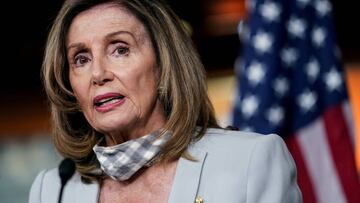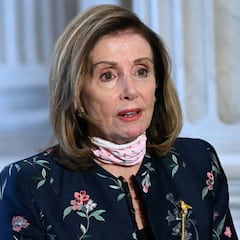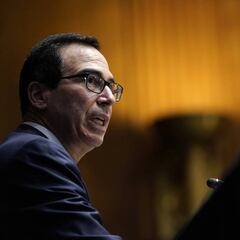Second stimulus check: how much would be paid to children and adults in new HEROES Act?
According to Pelosi and Democrats Monday's proposal for a second coronavirus relief payment includes child tax credit and adult dependents revisions.

In news dwarfed by the anticipation and fallout from the first presidential debate on Tuesday evening in Ohio, the latest plan for a second stimulus bill was announced by Democrats on Monday.
House Speaker Nancy Pelosi in a letter to Democrats said that the bill, called the HEROES Act (Health and Economic Recovery Omnibus Emergency Solutions) “provides the absolutely needed resources to protect lives, livelihoods and the life our democracy over the coming months.”
NEW: @HouseDemocrats have released an updated version of the #HeroesAct. This $2.2 trillion coronavirus response bill addresses urgent needs that have developed since the House last acted and reflects ongoing bipartisan negotiations.
— House Appropriations (@AppropsDems) September 28, 2020
Learn more: https://t.co/YKvDN2IaSk
The key details of the new stimulus check proposal: HEROES Act
A second stimulus payment would largely mirror the initial round of checks, which was authorised in March by the Coronavirus Aid, Relief, and Economic Security Act, or CARES Act.
- Individual taxpayers with incomes of up to $75,000 would receive $1,200.
- Married taxpayers with incomes of up to $150,000 would receive $2,400.
- An additional $500 for each dependent.
As with the CARES payments, the recipients would see their payments reduced if they earn above those limits, phasing out completely at $99,000 for single taxpayers and $198,000 for married couples.
How much will children get paid?
One integral difference is how the updated stimulus bill treats dependents. In the first round, only children under 17 years old received the $500 payments, and adult dependents were excluded. This meant that high school and college students who are listed as dependents on their parents' tax returns didn't qualify for the $500 checks. The updated HEROES Act specifies that any dependent, regardless of age, would qualify for the $500.
Latest Stimulus Proposal: Child Tax Credits
Also in Monday's release, Democrats proposed that child tax credit benefits and refunds should be scaled down from the original proposal. Now the per-child benefit will be $2,000, and for children under 6 it’s $3,600 according to Forbes.
$600 extra in federal unemployment benefits
The proposal would also reinstate the $600 federal unemployment booster that expired at the end of July. According to the latest plans, payments would continue until the end of January 2021. This would “provide a vital safety net for the record number of Americans who are unemployed, including those connected to the gig-economy,” claimed the memo released by House Democrats.
Will this latest proposal lead to a new relief bill?
Pelosi managed to squeeze in a dig at Republicans in her statement Monday, mentioning that the latest proposal is a package that's $1.2 trillion less than the Democrats' original proposed HEROES Act of $3.4 trillion in May, which failed to progress against opposition from Republicans.
“Democrats are making good on our promise to compromise with this updated bill, which is necessary to address the immediate health and economic crisis facing Americas working families right now,” Pelosi said. “We have been able to make critical additions and reduce the cost of the bill by shortening the time covered for now,” she added.
Talks have largely been at a standstill since the Democrats made their proposal in May, with both sides keen to make a deal but many other issues taking priority. This has been met with mounting frustration across Democratic party
It’s been 5 months since the House passed the HEROES Act. Instead of focusing on urgent #COVID19 relief for American families, Mitch McConnell has prioritized rushing through an illegitimate Supreme Court nomination. Americans deserve better—we must bring a bill to the floor.
— Sen. Cory Booker (@SenBooker) September 28, 2020
Related stories
Now, with the November 3 election looming, there seems to be some more movement on the proposal. In a tweet Tuesday, deputy chief of staff and Pelosi spokesman Drew Hammill suggested things are progressing: "Speaker Pelosi and Secretary Mnuchin spoke this morning by phone at 9:30 a.m. for approximately 50 minutes. The two went over the provisions of the updated Heroes Act and agreed to speak again tomorrow."
Speaker Pelosi and Secretary Mnuchin spoke this morning by phone at 9:30 a.m. for approximately 50 minutes. The two went over the provisions of the updated Heroes Act and agreed to speak again tomorrow.
— Drew Hammill (@Drew_Hammill) September 29, 2020
Millions in need of second Covid-19 relief payment
Although America’s unemployment rate has declined to 8.4% in August from a high of 14.7% in April, still more than 21 million workers are jobless because of the pandemic, according to an estimate from the Economic Policy Institute.


